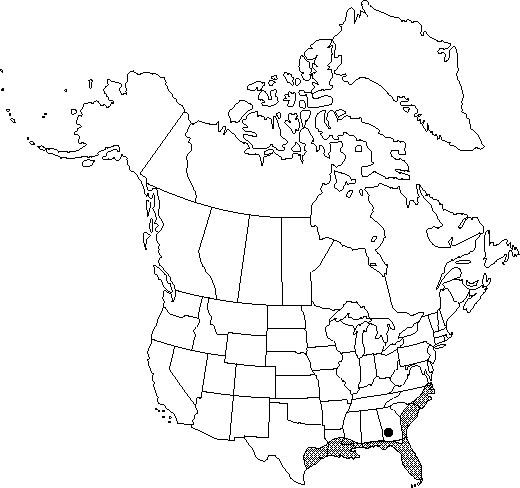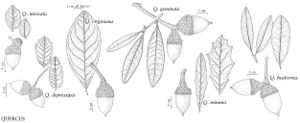Difference between revisions of "Quercus virginiana"
Gard. Dict. ed. 8, Quercus no. 16. 1768.
FNA>Volume Importer |
FNA>Volume Importer |
||
| Line 30: | Line 30: | ||
}}<!-- | }}<!-- | ||
| − | --><span class="statement" id="st- | + | --><span class="statement" id="st-undefined" data-properties=""><b>Trees,</b> sometimes shrubs, subevergreen, trees to 35 m, shrubs sometimes rhizomatous. <b>Bark</b> dark brown or black, scaly. <b>Twigs</b> yellowish to light gray, 1-3 mm diam., minutely puberulent or stellate-pubescent, glabrate in 2d year. <b>Buds</b> reddish or dark brown, subglobose or ovate, 1-2 mm; scale margins glabrous or puberulent. <b>Leaves</b>: petiole 1-10(-20) mm. <b>Leaf</b> blade obovate to oblanceolate, sometimes orbiculate or lance-ovate, ± planar, (10-)35-90(-150) × (15-)20-40(-85) mm, base cuneate to rounded, rarely truncate or cordate, margins minutely revolute or flat, entire or irregularly 1-3-toothed on each side, teeth mucronate, secondary veins obscure, 6-9(-12) on each side, apex obtuse-rounded or acute; surfaces abaxially whitish or glaucous, densely covered with minute, appressed, fused-stellate hairs, light green and glabrate in shade leaves, adaxially dark or light green, glossy, glabrous or with minute, scattered, stellate hairs. <b>Acorns</b> 1-3, on peduncle (3-)10-20 mm; cup hemispheric or deeply goblet-shaped, 8-15 mm deep × 8-15 mm wide, base often constricted; scales whitish or grayish, proximally thickened, keeled, tomentulose, tips reddish, acute-attenuate, glabrous or puberulent; nut dark brown, barrel-shaped, ovoid, or obcylindric, 15-20(-25) × 8-15 mm, apex rounded or blunt, glabrous. <b>Cotyledons</b> connate.</span><!-- |
-->{{Treatment/Body | -->{{Treatment/Body | ||
| Line 64: | Line 64: | ||
|publication year=1768 | |publication year=1768 | ||
|special status=Endemic;Selected by author to be illustrated;Weedy | |special status=Endemic;Selected by author to be illustrated;Weedy | ||
| − | |source xml=https://jpend@bitbucket.org/aafc-mbb/fna- | + | |source xml=https://jpend@bitbucket.org/aafc-mbb/fna-data-curation.git/src/9216fc802291cd3df363fd52122300479582ede7/coarse_grained_fna_xml/V3/V3_61.xml |
|genus=Quercus | |genus=Quercus | ||
|section=Quercus sect. Quercus | |section=Quercus sect. Quercus | ||
|species=Quercus virginiana | |species=Quercus virginiana | ||
| − | |||
| − | |||
| − | |||
| − | |||
| − | |||
| − | |||
| − | |||
| − | |||
| − | |||
| − | |||
| − | |||
| − | |||
| − | |||
| − | |||
| − | |||
| − | |||
| − | |||
| − | |||
| − | |||
| − | |||
| − | |||
| − | |||
| − | |||
| − | |||
| − | |||
| − | |||
| − | |||
| − | |||
| − | |||
| − | |||
| − | |||
| − | |||
| − | |||
| − | |||
| − | |||
| − | |||
| − | |||
| − | |||
| − | |||
| − | |||
| − | |||
| − | |||
| − | |||
| − | |||
| − | |||
| − | |||
| − | |||
| − | |||
| − | |||
| − | |||
| − | |||
| − | |||
| − | |||
| − | |||
}}<!-- | }}<!-- | ||
-->[[Category:Treatment]][[Category:Quercus sect. Quercus]] | -->[[Category:Treatment]][[Category:Quercus sect. Quercus]] | ||
Revision as of 13:44, 27 July 2019
Trees, sometimes shrubs, subevergreen, trees to 35 m, shrubs sometimes rhizomatous. Bark dark brown or black, scaly. Twigs yellowish to light gray, 1-3 mm diam., minutely puberulent or stellate-pubescent, glabrate in 2d year. Buds reddish or dark brown, subglobose or ovate, 1-2 mm; scale margins glabrous or puberulent. Leaves: petiole 1-10(-20) mm. Leaf blade obovate to oblanceolate, sometimes orbiculate or lance-ovate, ± planar, (10-)35-90(-150) × (15-)20-40(-85) mm, base cuneate to rounded, rarely truncate or cordate, margins minutely revolute or flat, entire or irregularly 1-3-toothed on each side, teeth mucronate, secondary veins obscure, 6-9(-12) on each side, apex obtuse-rounded or acute; surfaces abaxially whitish or glaucous, densely covered with minute, appressed, fused-stellate hairs, light green and glabrate in shade leaves, adaxially dark or light green, glossy, glabrous or with minute, scattered, stellate hairs. Acorns 1-3, on peduncle (3-)10-20 mm; cup hemispheric or deeply goblet-shaped, 8-15 mm deep × 8-15 mm wide, base often constricted; scales whitish or grayish, proximally thickened, keeled, tomentulose, tips reddish, acute-attenuate, glabrous or puberulent; nut dark brown, barrel-shaped, ovoid, or obcylindric, 15-20(-25) × 8-15 mm, apex rounded or blunt, glabrous. Cotyledons connate.
Phenology: Flowering late winter–early spring.
Habitat: Coastal plain, open evergreen woodlands, scrublands, and hummocks on loam, clay, and rarely on sand on immediate coast
Elevation: 0-200 m
Distribution

Ala., Fla., Ga., La., Miss., N.C., S.C., Tex., Va.
Discussion
Quercus virginiana is one of the commonest and best known species in the coastal region of the southeastern United States. In the past, it was widely used for structural pieces in the manufacture of wooden ships, and large groves were actually considered a strategic resource by the federal government. Historically oil pressed from the acorns was utilized. Like other members of the live oak group (Q. minima, Q. geminata, and Q. fusiformis), Q. virginiana seedlings form swollen hypocotyls that may develop into large, starchy, underground tubers. In the past, the tubers were gathered, sliced, and fried like potatoes for human consumption. The tendency for the tree members of this group to produce rhizomatous growth and clonal shrubs in juvenile stages, and in response to damage, fire, and poor soil conditions, has led to considerable confusion in delimiting the species. This is exacerbated by considerable plasticity in leaf form. When evaluating specimens an effort should be made to sample broadly within a population. The tuberous condition mentioned above suggests that live oaks have different phases in their life history that may persist depending on the environmental conditions. This is not uncommon in other woody plants that occur in seasonally dry, fire-prone habitats of the southeastern United States.
The Houma used Quercus virginiana medicinally for healing dysentery (D. E. Moerman 1986).
Putative hybrids between Quercus virginiana and Q. minima are known, but care should be taken to avoid assigning hybrid status to clonal phases of Q. virginiana solely on the basis of habit. Hybrids with Q. fusiformis and Q. geminata are discussed under those species. Occasional putative hybrids with Q. stellata are also found, and those tend to be semi-evergreen with shallowly lobed leaves.
Some named putative hybrids are: Q. ×burnetensis Little (= Q. macrocarpa × Q. virginiana); Q. ×comptonae Sargent (= Q. lyrata × Q. virginiana); and the artificially produced hybrid, Q. ×nessiana E. J. Palmer (= Q. bicolor × Q. virginiana).
Selected References
None.
